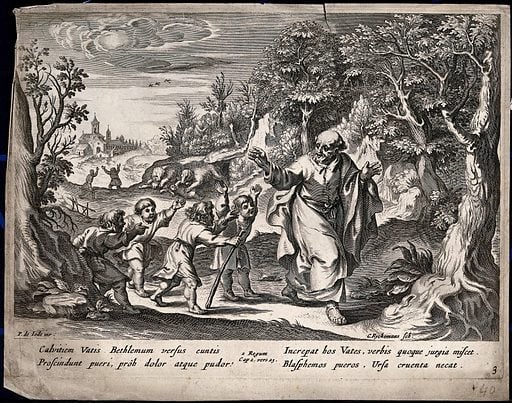Can we believe this story?
The Hebrew Bible (Old Testament) offers the story of Elisha and the Two Bears (2 Kings 2:23-25). A large group of young men insulted Elisha by insulting him with “baldy” (“Go up [to Heaven], you baldhead”). Elisha cursed them then two bears came out and “tore up” 24 of their number. Some believe this story is real and justify it.

Elisha and the Bears
On the face of it, the story doesn’t seem true to the character of Elisha or of God. It seems unlikely that the two bears mauled 24 young men (twelve to thirty years old) running in 24 different directions.
This is a perfect example of context. Does it fit with the example of the love God shows to us or that he expects from us, as taught by Judaism, Christianity, and other religions? Or is it just some tale told to get more respect from young people? Or does it belong in the Bible at all? Can the Bible be believed with stories in it that seem opposite to what we know?
In defense, if there can be any defense, Bethel was a place of idolatry and rebellion. “These youths were typical of a nation that “mocked the messengers of God, despised His words, and scoffed at His prophets.” This may have been a mob (exceeded 42), more like a gang, not just taunting the prophet, but bent on violence. Both Deuteronomy 27-28 and Leviticus 26 promise God will send depending on how the people act: blessings for obedience and curses for disobedience. The story can be seen in the light of Leviticus 26:22: “I will let loose among you the beasts of the field, which will bereave you of your children and destroy your cattle and reduce your number so that your roads lie deserted.” It was a very harsh time and according to God’s agreement with the people there would be harsh penalties for disobedience. Even the King’s disobedience brought calamity on the people.
Today we would likely refuse such an agreement and see it as egregious. But regarding Elisha’s actions, they may have been in self-defense from a mob that would have done him harm.
True Witness
Does the Bible even purport to be a true witness to God and give us the meaning of the events in it?
“And He [Jesus] did not let him, but He said to him, “Go home to your people and report to them what great things the Lord has done for you, and how He had mercy on you.” (Mark 5:19, Luke 8:39.)
How does Elisha’s actions compare On the Biblical view on how to treat children, see Matthew 19: 13 – 15, Mark 10: 13 – 16, and Luke 18: 15 – 17.
Do Elisha’s actions bring respect or disrespect for prophets? Culturally it might have depended on the era and notions of respect in that era.
Actions of people are most telling
““Beware of the false prophets, who come to you in sheep’s clothing, but inwardly are ravenous wolves. You will know them by their fruits. Grapes are not gathered from thorn bushes nor figs from thistles, are they? So every good tree bears good fruit, but the bad tree bears bad fruit. A good tree cannot produce bad fruit, nor can a bad tree produce good fruit. Every tree that does not bear good fruit is cut down and thrown into the fire. So then, you will know them by their fruits.”
Elisha in 2 Kings 2 is portrayed as a strong supporter of Elijah, but who wanted more power (double dose of his spirit) as a prophet. His actions demonstrate miracles and benevolent acts. What was the benevolent act or miracle in this story? That Elisha or God would destroy young people on a whim? Could God not have swept them away with a sudden storm?
What was the enduring “fruit” of this story?
Literary Analysis view
The person who assembled these texts into “book” form seemed to favor the prophets and showed kingship only brings calamity because of King after King’s failure to worship God properly and they disregarded the prophets. Not having a king is a strong theme in the Hebrew Bible – it took power from the prophets.
The “Deuteronomist” who assembled these texts brought together the official annals of the kings and prophets into one book in around 700 BCE, and in variations in the text there is evidence he added his own thoughts in places and edited in places. He could have chosen to leave out the Elisha story.
The Deuteronomist seemed to have an agenda of slanting the narrative into destroying the power of kingship while glorifying the power of the prophets.
The individual reader will have to decide whether or not the story does bring respect for God and God’s representatives, or says that punitive measures on the young are appropriate. Certainly individual preferences will sway people one way or another.
God breathes life into writings. Life in the Bible generally means: “the real life, the vital connection with the world and God, the sum total of man’s highest interests.” This story likely makes people uneasy and doesn’t seem to fit for a reason.
As this section illustrates, the Bible is complex and not at all easy to understand. It might be that it isn’t even beneficial for people without a critical mind and a good knowledge of history to even be reading sections like this. I don’t feel that the Hebrew Bible and much of the New Testament are good for much but scholarship.
Takeaway
Since the printing press was developed, the job of twisting the words and meaning of the Bible transferred from priests to individuals. It’s wasn’t and isn’t a pretty picture.
For many people the Bible is a knotty and perilous book. For some it’s a source for examples that tell the vicious things they want to put on others. For some it’s a way to justify their ill intent. For many it’s a book that inspires them to better living and greater things. Yet the Bible should never fall solely into the hands of an elite class – we know from history that way brings insufferable corruption.
For people who want to be led by the ways God has shown us, they can read portions of the Bible and find God has breathed life into the words and into them. Each individual can prove the value of Scripture in their own lives.
For those who have their own agenda when reading the Bible, distorted perception is not reality. It’s the path to insanity and ruin.
________________________
The standard of belief and conduct for Christianity is love. Legal standard.
________________________
If you find these articles intriguing, please consider joining the mailing list.
If I’ve challenged your thinking, I’ve done my job.
___________________
Our answer is God. God’s answer is us. Together we make the world better.
– Dorian













